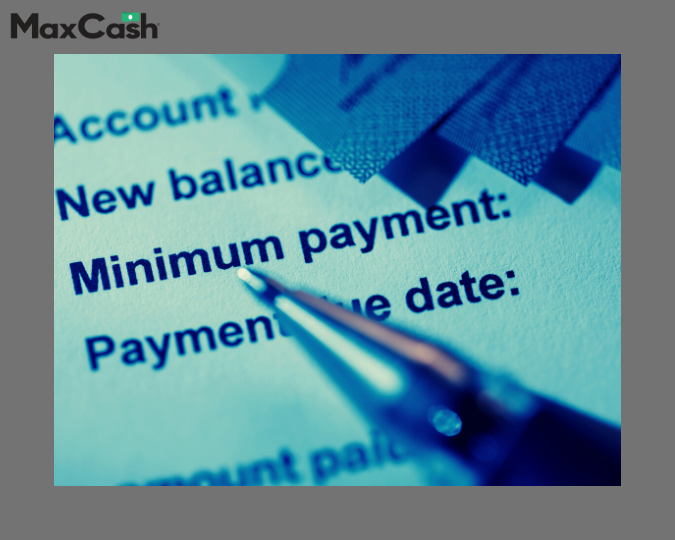Is It Smart to Pay More Than The Minimum?
Should you pay more than the minimum credit card payment each month? Paying more than the minimum payment on your credit card can be a good financial decision for several reasons. You may want to consider paying more than the minimum payment on your credit card. Max Cash® gives you a few reasons why:
- Avoiding high interest charges: One of the main benefits of paying more than the minimum payment on your credit card is that you can avoid accruing high interest charges. Credit card interest is charged on the unpaid balance of your credit card, and if you only make the minimum payment each month, it can take a long time to pay off your balance. By paying more than the minimum payment, you can reduce your unpaid balance faster and avoid paying as much interest.
- Improving your credit score: Another benefit of paying more than the minimum payment on your credit card is that it can improve your credit score. Credit scores are based on a variety of factors, including your payment history and credit utilization ratio. By paying more than the minimum payment, you can show that you are responsible with your credit and improve your credit score.
- Paying off your debt faster: Finally, paying more than the minimum payment can help you pay off your debt faster. The faster you pay off your credit card balance, the less you will have to pay in interest charges. This can save you money in the long run and help you become debt-free faster.
Paying more than the minimum payment on your credit card can be a good financial decision. It can help you avoid high interest charges, improve your credit score, and pay off your debt faster. If you are able to pay more than the minimum on your credit card, it is worth considering in order to achieve these benefits.
Should I Pay More Than The Minimum Payment On My Credit Card?
Yes, it is generally a good idea to pay more than the minimum payment on your credit card. When you only pay the minimum payment, you will end up paying more in the long run due to interest. Paying more than the minimum payment can help you pay off your balance faster and save money on interest. It can also help improve your credit score, as paying more than the minimum payment shows that you are managing your credit responsibly.
How much of my income should I devote to paying down debt?
There is no one-size-fits-all answer to this question, as the amount you should devote to paying down debt depends on your individual financial situation. However, a good rule of thumb is the 50/30/20 budgeting rule. Under this rule, you would allocate 50% of your income to necessities, such as housing, food, and transportation; 30% to wants, such as entertainment and dining out; and 20% to savings and debt repayment. This means that you should aim to devote at least 20% of your income to paying down debt. If you have a large amount of debt, you may need to devote more than 20% of your income to debt repayment in order to pay it off in a reasonable amount of time. It’s important to keep in mind that this is just a guideline and you may need to adjust the proportions based on your personal financial situation.
Here Are Some Tips to Save Money
There are many ways to save money. Here are a few tips:
- Make a budget: This will help you track your income and expenses, and see where you can cut back. Start by listing all of your income sources, then make a list of all your expenses, including bills, groceries, gas, entertainment, and anything else you spend money on. Subtract your expenses from your income to see if you’re spending more than you’re earning. If you are, look for ways to reduce your expenses or increase your income.
- Spend less than you earn: This is the most basic rule of saving money, but it’s also one of the most important. Try to live below your means and avoid taking on too much debt.
- Save automatically: Set up automatic transfers from your checking account to your savings account so you don’t have to remember to do it manually. This can be a helpful way to save because it takes the decision out of your hands and makes saving a habit.
- Cut your expenses: Look for ways to reduce your monthly expenses, such as by canceling subscriptions or negotiating your bills. Consider cutting back on non-essential expenses, like eating out or buying expensive coffee, and redirect that money into your savings.
Increase your income
Consider taking on a part-time job or freelance work to boost your income. You could also sell items you no longer need or use to bring in some extra cash.
- Shop around: Don’t be afraid to negotiate or shop around for better prices on the things you buy. Look for sales, coupons, and discounts, and consider purchasing generic or store-brand items instead of more expensive name brands.
- Save your raises and bonuses: When you get a raise or bonus at work, put at least some of it into savings. This can be a great opportunity to increase your savings without feeling like you’re cutting back on your spending.
- Put your savings to work: Consider investing your savings so they can grow over time. There are many different investment options to choose from, so it’s a good idea to do some research and find one that aligns with your financial goals and risk tolerance.
Remember, the key to saving money is to make it a habit. The more you practice it, the easier it will become.
Max Cash Has Credit Card Offers For You!
We at Max Cash are always working to find the best partners and credit card offers available for you. We have four credit card offers available for you from four great partners. Some are pre-approved and won’t impact your credit rating if you apply. Click here to start the process and get a new card today!




